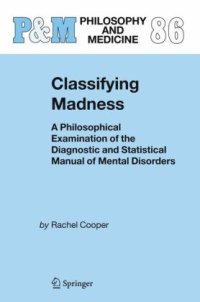
Ebook: Classifying Madness: A Philosophical Examination of the Diagnostic and Statistical Manual of Mental Disorders (Philosophy and Medicine)
Author: Rachel Cooper
This book is about the Diagnostic and Statistical Manual of Mental Disorders, more commonly known as the D.S.M. The D.S.M. is published by the American Psychiatric Association and aims to list and describe all mental disorders. The D.S.M. is embedded in mental health care at every turn. In the U.S., hospital records note a D.S.M. diagnosis and medical insurance companies demand D.S.M. codes before they will consider reimbursing for the cost of care. Worldwide, research papers are couched in D.S.M. terminology and pharmaceutical companies list the D.S.M. diagnoses that their drugs treat. Mental health professionals, and their patients, can not avoid being affected by the D.S.M. The D.S.M. is important, but it is also controversial. While its publishers claim that the D.S.M. is a scientific classification system based on sound data, many have doubts. Big business has interests in the D.S.M. Perhaps the D.S.M. has been distorted by pressures stemming from insurance companies, or from pharmaceutical companies? Others are concerned that whether a condition is classified as a mental disorder depends too greatly on social and political factors. More conceptual worries are also frequent. If classification requires a theory, and if mental disorders are poorly understood, then a sound classification system may be presently unobtainable. Possibly even attempting to construct a classification system that "cuts nature at the joints" is conceptually na?ve. Maybe types of mental disorder are radically unlike, say, chemical elements, and simply fail to have a natural structure. Classifying Madness offers a sustained philosophical critique of the D.S.M. that addresses these concerns. The first half of the book asks whether the project of constructing a classification of mental disorders that reflects natural distinctions makes sense. I conclude that it does. The second half of the book addresses epistemic worries. Even supposing a natural classification system to be possible in principle, there may be reasons to be suspicious of the categories included in the D.S.M. I examine the extent to which the D.S.M. depends on psychiatric theory, and look at how it has been shaped by social and financial factors. I aim to be critical of the D.S.M. without being antagonistic towards it. Ultimately, however, I am forced to conclude that although the D.S.M. is of immense practical importance, it is not on track to become the best possible classification of mental disorders. Classifying Madness will be of interest to both mental health professionals and to philosophers interested in classification in science. The possibility that there may be philosophical difficulties with the D.S.M. has become a commonplace in the mental health literature, and Classifying Madness offers mental health professionals an opportunity to explore suspicions that there might be conceptual problems with the D.S.M. For philosophers, this book aims to contribute to debates in the philosophy of science concerning natural kinds, the theory-ladenness of classification, and the effect of sociological factors in science. These issues are normally approached via a consideration of the natural sciences and, as will be seen, approaching them via a consideration of psychiatry helps shed new light on old problems.
Download the book Classifying Madness: A Philosophical Examination of the Diagnostic and Statistical Manual of Mental Disorders (Philosophy and Medicine) for free or read online
Continue reading on any device:

Last viewed books
Related books
{related-news}
Comments (0)